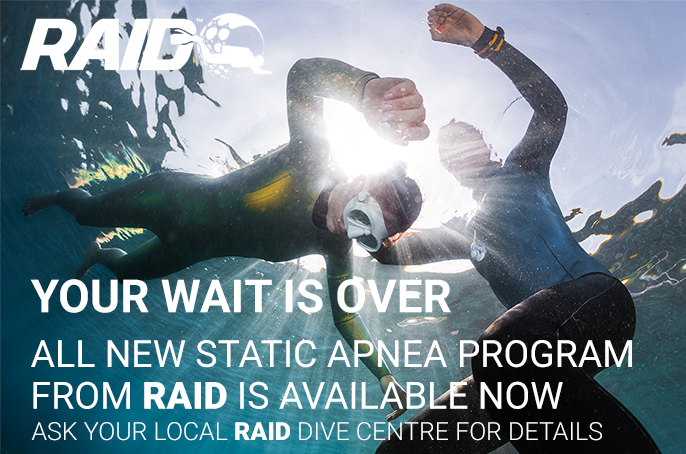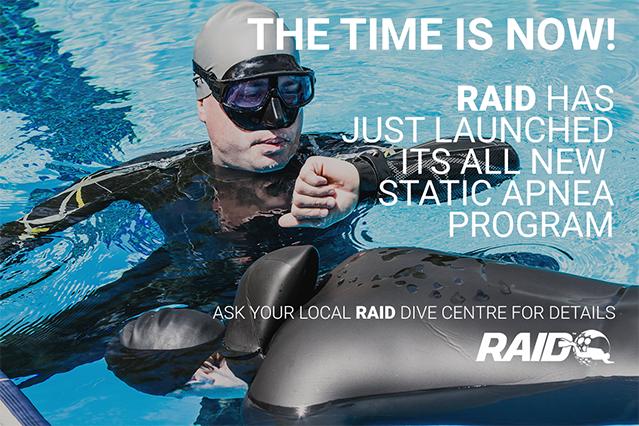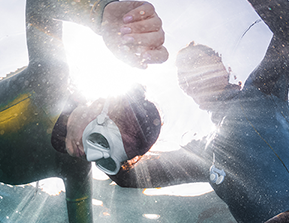RAID STATIC APNEA PROGRAM

We are thrilled to announce the launch of our innovative Static Apnea Program. This groundbreaking initiative represents a significant development in our offerings, and we have high hopes for its success and impact within the diving community.
This specialty program can be taught by all active RAID Freediving Pool Instructor. (This program is restricted to activity in pool or pool-like conditions.) It is the ultimate guide for anyone looking to master the mentally demanding discipline of static breath-holding in freediving. Whether a student is a beginner or an experienced freediver, this comprehensive manual provides step-by-step instructions, expert tips, and detailed tables to help them increase their breath hold time and achieve a personal best. Learn relaxation techniques, visualization strategies, and the important role of a buddy in static apnea. With this manual, students will gain the knowledge and confidence to excel in static apnea and take freediving skills to new depths.
Static apnea, what most of us would call ‘structured breath holding,’ is practiced for various reasons besides being an essential part of freediver development. These include health benefits for all water enthusiasts including scuba and rebreather divers!
Some potential benefits of static apnea for health include:
- Improved breath control: Practicing static apnea can help improve your ability to control and regulate your breath, which can be beneficial for managing stress and anxiety.
- Increased lung capacity: Regular breath-holding exercises like static apnea can help expand your lung capacity over time, leading to better respiratory function.
- Enhanced cardiovascular health: Static apnea can stimulate the body to adapt to lower levels of oxygen, potentially improving the efficiency of the cardiovascular system.
- Mental fortitude: Training in static apnea requires mental discipline and focus, which can translate to greater mental strength and resilience in other areas of life.
- Deep Relaxation: While holding your breath, many people experience a deep sense of relaxation as a result of the focused breathing and the body’s physiological responses to apnea.
- Connection with Nature: Static apnea can help you develop a profound connection with your body and breath, fostering a greater awareness of your respiratory patterns and the importance of breathing in your daily life.
In addition, unlike other RAID diving activities, static apnea is a Competitive Sport where participants compete to hold their breath for the longest time possible. This adds an element of excitement and motivation for those interested in pushing their limits and setting records.And of course, static apnea training is one of the central principles of freediving, and during the coming months, RAID will be boosting its freediving program. The launch of this completely new, totally revamped, recreated static apnea program is one of the first steps.
Static apnea for scuba divers
Static apnea, or breath-holding, can be particularly beneficial for scuba divers as it helps improve breath control, lung capacity, and overall comfort in the water. Here are some specific benefits of static apnea for scuba divers:

Increase in breath-holding time: By training in static apnea, scuba divers can improve their ability to hold their breath, which can be advantageous when diving underwater for extended periods.
Enhanced relaxation: Practicing static apnea techniques can help divers stay calm and relaxed underwater, which is crucial for conserving energy and avoiding panic while scuba diving.
Improved lung capacity: Static apnea training can expand lung capacity, allowing divers to take deeper and more efficient breaths, which can be beneficial for buoyancy control and overall comfort while diving.
Better equalization: Breath-holding exercises can help divers improve their ability to equalize pressure in their ears and sinuses, reducing the risk of discomfort or injury during descents.
It’s essential for scuba divers who practice static apnea to know the guidelines, and safely and gradually increase breath-holding times to avoid hypoxia or other risks associated with breath-holding exercises. Additionally, divers should always dive within their limits and be aware of safe diving practices. So, this course is a must-have.
Overall, static apnea combines physical endurance, mental focus, relaxation, and competitive spirit, making it a unique and cool activity for those interested in breath control and challenging themselves.


